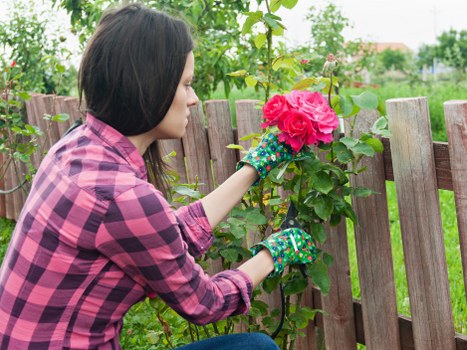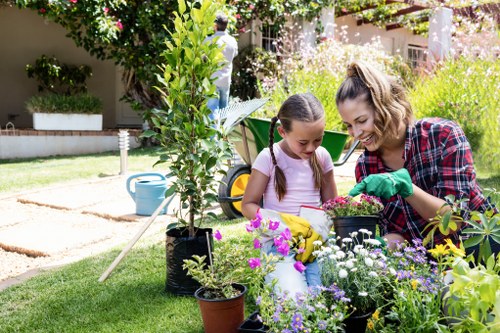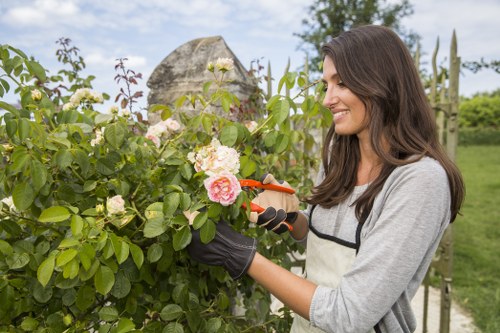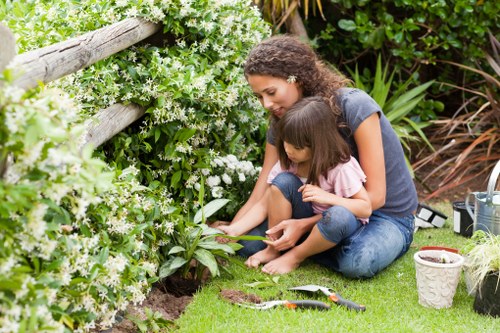Garden Fencing in Gardening Company

When it comes to enhancing the beauty and functionality of your outdoor space, garden fencing plays a pivotal role. A well-designed fence not only defines the boundaries of your garden but also adds to its aesthetic appeal. In a gardening company, providing top-notch fencing solutions is essential for meeting the diverse needs of clients.
Garden fencing serves multiple purposes, from providing privacy and security to acting as a decorative element that complements the overall landscape design. Whether you have a sprawling backyard or a compact urban garden, the right fencing can make a significant difference.
Choosing the appropriate type of fence involves considering various factors such as material, height, and style. A professional gardening company can guide you through the selection process, ensuring that your fencing meets both functional and aesthetic requirements.
Importance of Garden Fencing

Garden fencing is more than just a boundary marker; it plays a crucial role in defining your outdoor space. Here are some key reasons why garden fencing is important:
- Privacy: Fences provide a sense of seclusion, allowing you to enjoy your garden without the prying eyes of neighbors.
- Security: A sturdy fence can deter unwanted animals and intruders, safeguarding your property.
- Wind Protection: Fencing can act as a barrier against strong winds, creating a more comfortable outdoor environment.
- Boundary Definition: Clearly marks the limits of your garden, preventing disputes with neighbors.
Understanding the importance of fencing can help you make informed decisions when planning your garden’s layout and design.
Types of Garden Fencing

There are various types of garden fencing available, each offering unique benefits and aesthetics. Here are some popular options:
- Wooden Fences: Classic and versatile, wooden fences can be customized to fit any garden style.
- Metal Fences: Durable and low-maintenance, metal fences provide a sleek and modern look.
- Vinyl Fences: Known for their longevity, vinyl fences are resistant to weather and require minimal upkeep.
- Composite Fences: Combining the best of wood and plastic, composite fences offer durability and aesthetic appeal.
- Bamboo Fences: Eco-friendly and stylish, bamboo fences are perfect for tropical or minimalist gardens.
Each type of fence has its own set of advantages, and the best choice depends on your specific needs and preferences.
Materials Used in Garden Fencing

The material of your garden fence significantly impacts its durability, appearance, and maintenance requirements. Common materials include:
- Wood: Offers a natural look but requires regular maintenance to prevent weather damage.
- Metal: Steel and aluminum are popular for their strength and longevity.
- Vinyl: Resistant to rot and pests, vinyl is a practical choice for low-maintenance fencing.
- Composite: Made from recycled materials, composites are environmentally friendly and durable.
- Bamboo: Sustainable and aesthetically pleasing, bamboo is ideal for certain garden themes.
Choosing the right material involves balancing factors like budget, climate, and desired style.
Design and Aesthetics

The design of your garden fencing should complement the overall landscape and architectural style of your home. Consider the following design elements:
Height and Scale
The height of the fence affects both privacy and the visual balance of your garden. Taller fences provide more privacy, while shorter ones can enhance openness.
Color and Finish
Choosing the right color can make your fence a focal point or blend seamlessly with the surroundings. Finishes like stains or paints can add texture and depth.
Ornamental Features
Incorporate decorative elements such as finials, lattice work, or scalloped tops to add character and uniqueness to your fencing.
Tip: Work with a gardening company to create a design that reflects your personal style and complements your garden’s flora.
Installation Process
Professional garden fencing installation ensures that your fence is properly secured and aligned. The typical installation process includes:
- Consultation: Assessing your garden’s layout and understanding your fencing needs.
- Measurement: Taking precise measurements to determine the amount of materials required.
- Preparation: Clearing the area and preparing the ground for installation.
- Installation: Erecting the fence panels, securing posts, and ensuring stability.
- Finishing: Applying any desired finishes or treatments to enhance durability and appearance.
Choosing a reputable gardening company for installation can save time and ensure a high-quality result.
Maintenance Tips
To keep your garden fencing in optimal condition, regular maintenance is essential. Here are some tips:
- Regular Cleaning: Remove dirt, moss, and debris to prevent deterioration.
- Inspect for Damage: Check for loose panels, rust, or rot and address issues promptly.
- Repainting or Staining: Protect wooden fences by applying protective coatings every few years.
- Vegetation Control: Keep plants and vines trimmed to prevent damage and maintain the fence’s integrity.
Proper maintenance extends the lifespan of your fence and keeps it looking fresh and attractive.
Benefits of Professional Installation
Hiring a professional gardening company for fence installation offers numerous benefits:
- Expertise: Professionals have the knowledge and experience to handle various fencing materials and designs.
- Efficiency: A professional team can complete the installation quickly and accurately.
- Quality Assurance: Ensures that the fence is securely installed and meets safety standards.
- Warranty: Many companies offer warranties on their work, providing peace of mind.
Investing in professional installation can save you time, money, and potential headaches in the long run.
Choosing the Right Gardening Company
Selecting the right gardening company is crucial for a successful fencing project. Consider the following factors:
Experience and Reputation
Look for companies with a proven track record and positive customer reviews. Experience ensures they can handle your specific fencing needs.
Portfolio
Reviewing a company’s portfolio allows you to assess the quality and variety of their work.
Pricing
Ensure that the company provides transparent pricing and fits within your budget without compromising on quality.
Action: Contact us today to discuss your garden fencing needs with our experienced team.
Cost Considerations
The cost of garden fencing varies based on several factors:
- Material: Different materials come with different price points.
- Height and Length: Larger fences require more materials and labor, increasing the cost.
- Design Complexity: Intricate designs with decorative elements may cost more.
- Installation: Professional installation fees vary depending on the company and project size.
- Maintenance: Consider long-term maintenance costs when choosing materials.
Obtaining multiple quotes and understanding what’s included can help you make an informed decision.
Conclusion
A well-chosen and professionally installed garden fence can transform your outdoor space, providing both functionality and beauty. By partnering with a reputable gardening company, you ensure that your fencing project meets your expectations and enhances your garden’s overall appeal.
Ready to elevate your garden? Book your service now and let our experts create the perfect fencing solution for your outdoor sanctuary.